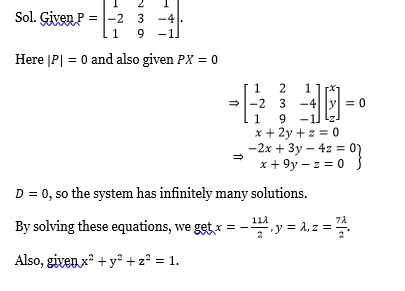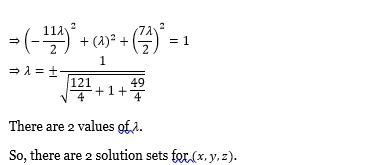Maths Matrices
Get insights from 118 questions on Maths Matrices, answered by students, alumni, and experts. You may also ask and answer any question you like about Maths Matrices
Follow Ask QuestionQuestions
Discussions
Active Users
Followers
New answer posted
4 months agoIf A = {X = (x,y,z)?: PX=0 and x²+y²+z²=1}, where P = [1, 2, 1; -2, 3, -4; 1, 9, -1], then the set A
New answer posted
4 months agoContributor-Level 9
A? A = I
⇒ a²+b²+c²=1 and ab+bc+ca=0
Now, (a+b+c)²=1 ⇒ a+b+c=±1
So, a³+b³+c³-3abc = (a+b+c) (a²+b²+c²-ab-bc-ca) = (±1) (1-0)=±1
⇒ 3abc = 2±1 = 3,1
⇒ abc = 1, 1/3
New answer posted
4 months agoContributor-Level 10
2x-y+2z=2
x-2y+λz=-4
x+λy+z=4
For no solution:
D=|2, -1,2; 1, -2, λ 1,1,1|=0
⇒ 2 (-2-λ²)+1 (1-λ)+2 (λ+2)=0
⇒ -2λ²+λ+1=0
⇒ λ=1, -1/2
D? =|2, -1,2; -4, -2, λ 4,1,1|
=2 (-2-λ)+1 (-4-4λ)+2 (-4+8)
=2 (1+λ) which is not equal to zero for λ=1, -1/2
New answer posted
4 months agoContributor-Level 10
|A|≠0
For (P): A≠I?
So, A = [1 0; 0 1] or [1; 0 1] or [1 0; 1]
or [1; 1 0]
So (P) is false.
A = [1 0; 1 0] or [1; 0 1] or [1 0; 1]
⇒ tr (A)=2
⇒ Q is true
New answer posted
4 months agoContributor-Level 9
System of equations can be written as
[2 3 6; 1 2 a; 3 5 9] [x; y; z] = [8; 5; b]
R? →R? -1/2R? , R? →R? -3/2R?
. the system will have no solution if 3-a=0 and b-13≠0.
i.e. for a=3 & b≠13.
New answer posted
4 months agoContributor-Level 10
Δ = |1,1, -1; 1,2, α 2, -1,1| = 1 (2+α)-1 (1-2α)-1 (-1-4) = 2+α+2α-1+5 = 3α+6=0 ⇒ α=-2.
Δ? = |2,1, -1; 1,2, α β, -1,1| = 2 (2+α)-1 (1-αβ)-1 (-1-2β) = 4+2α-1+αβ+1+2β = 4+2α+αβ+2β=0.
4-4-2β+2β=0. This holds.
Δ? = |1,2, -1; 1,1, α 2, β,1| = 1 (1-αβ)-2 (1-2α)-1 (β-2) = 1-αβ-2+4α-β+2 = 1+4α-αβ-β=0.
1-8+2β-β=0 ⇒ -7+β=0 ⇒ β=7.
α+β = -2+7 = 5.
New answer posted
4 months agoContributor-Level 10
A = [, [-1, 4]. |A| = 2 - 1 = 1.
Characteristic equation: λ² - tr (A)λ + |A| = 0 ⇒ λ² - 3λ + 1 = 0.
By Cayley-Hamilton, A² - 3A + I = 0. A? ¹ (A² - 3A + I) = A - 3I + A? ¹ = 0.
A? ¹ = 3I - A.
Comparing with A? ¹ = αI + βA, we get α=3, β=-1.
4 (α - β) = 4 (3 - (-1) = 16.
Taking an Exam? Selecting a College?
Get authentic answers from experts, students and alumni that you won't find anywhere else
Sign Up on ShikshaOn Shiksha, get access to
- 66k Colleges
- 1.2k Exams
- 681k Reviews
- 1800k Answers


